June 6, 2025 | 15:23 GMT +7
June 6, 2025 | 15:23 GMT +7
Hotline: 0913.378.918
June 6, 2025 | 15:23 GMT +7
Hotline: 0913.378.918

Central Highlands Coffee Garden. Photo: Minh Quy.
Beyond the horizontal lines of coffee plants in Cu Kuin district, Dak Lak province, a group of coffee growers talked about the world’s stories. Apart from market and pricing news, they addressed the COP26 Summit and the Prime Minister's commitment to green growth and Net Zero by 2050, as well as ecological and regenerative agriculture.
They are among the 21,000 sustainable coffee farming households participating in the Nestle Vietnam Company's Nescafe Plan Program, which was designed in partnership with the Western Highlands Agriculture and Forestry Technical Institute (WASI). Although the Nescafe Plan community represents a small proportion of the approximately 600,000 coffee-growing families in the Central Highlands, the stories of stakeholders' successes after ten years of implementation are apparent.
Mr. Hoang Van Son, a resident of Ea Ktur in the Cu Kuin area, depends solely on around 1 hectare of coffee. He used to be unable to sleep or eat when traditional agriculture resulted in an old and stunted coffee area, low annual yield of roughly 2 tons, and excessive fertilizer and pesticide usage, resulting in soil deterioration... His life was frequently unstable, despite spending nearly his entire life attached to coffee plants in the heart of red basaltic soils.
Mr. Son was sent to a technical training course on sustainable coffee farming in 2014 while participating in the Nescafe Plan initiative. There came a turning point in his life when, for the first time, he realized the importance of selecting high-quality coffee varieties, cultivating techniques, and plowing in order to minimize input costs while maintaining high output. The classes and training on topics such as economical watering, making micro-fertilizers, weed control, and preserving the quality of coffee after harvest... assisted Mr. Son in recognizing that the farming method had been a long-standing farming method that was both costly and harmful, as well as less effective.
"The Nescafe Plan program has assisted our farmers in increasing their usage of organic fertilizers, biological insecticides, and soil improvement, resulting in a 20-25 percent reduction in investment costs. From the first harvest, the family's coffee production climbed to 3 tons/ha, which are extremely visible impacts for us farmers," Mr. Son explained.
As a result of that "visible effect," after a short period of time, 74 households in the Ea Ktur coffee area were participating in the Nescafe Plan, covering an area of roughly 100 hectares.
Nescafe Plan's accomplishments in the Central Highlands region, in general, include hosting nearly 25,000 training sessions for 300,000 farming households, supporting over 53 million coffee seedlings, regenerating over 34,000 old and stunted coffee plants, and assisting 21,000 farming households in obtaining 4C international coffee certification...
The most significant accomplishment should be expanding the visibility of regenerative agriculture in the Central Highlands' sustainable coffee community. None of the participant's farm with pesticides; the land is enhanced using additional solutions and intercropping techniques; the farmer records a daily diary and manages the orchard using digital tools such as FARMS...
That is the method of farming; beginning with the seeding stage, Nestle has supported the importation of varieties with desirable characteristics for research and the development of variations for coffee replanting. Supporting the coffee propagation system through tissue culture, construction of net houses and greenhouses for coffee plant research and propagation... Things that were previously considered waste, such as coffee husks, are composted to create micro-fertilizers. From land to weeds, everything is managed and monitored...
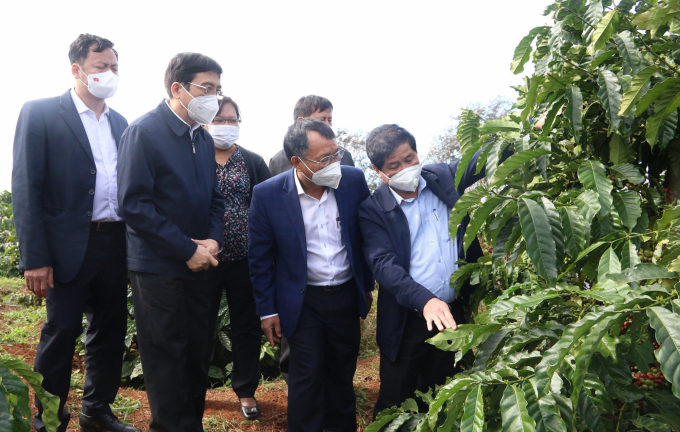
Deputy Minister Le Quoc Doanh visits a sustainable coffee model in the Central Highlands. Photo: Minh Quy.
Mr. Vo Quyet, deputy director of Thuan An Fair Agriculture Cooperative (Dak Mil district, Dak Nong province), characterized the transition as being similar to a revolution.
From 2021 until the present, the coffee-producing ground of Thuan An cooperative members was largely infertile, owing to excessive fertilizer and pesticide use. "The revolution is on the nod as farmers are now practicing organic farming in accordance with international standards, rather than spraying the entire garden with pesticides whenever a tree becomes ill," Mr. Vo Quyet stated.
Dr. Phan Viet Ha, Deputy Head of WASI, emphasized that altering farmers' agricultural patterns is not difficult if the models are truly successful. The models established by WASI and Nestle Vietnam Company have quickly become a popular place and a gathering place for Central Highlands farmers interested in sustainable coffee development.
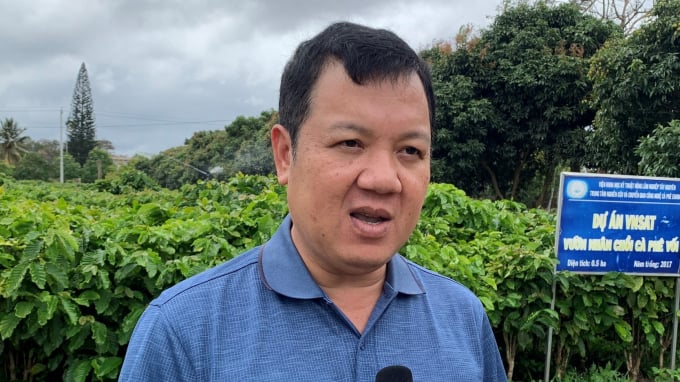
Dr. Phan Viet Ha, Deputy Director of WASI. Photo: Hoang Anh.
Not to mention the soft value or macroeconomic stories created by the models. Coffee intercropping with pepper, avocado, durian, and other fruit trees increases farmers' incomes by 30% to 100% when compared to conventional production. When farmers see the economic benefits, they are prepared to adhere rigidly to new processes and practices, and other agricultural values are formed.
In Lam Ha district (Lam Dong), Buon Ma Thuot city, and Cu M'gar district, models of coffee crop management and regenerative agriculture have been constructed (Dak Lak). Nestle Vietnam demonstrates the best practices in sustainable agriculture for the benefit of the public. Along with implementing the integrated crop management process, farmers can use agricultural practices that result in the most precise input investment. Renewable agriculture is a long-term vision, as well as a long-term goal for WASI and Nestle Vietnam's collaboration.
Dr. Phan Viet Ha
The achievements of the Nescafe Plan after over ten years of implementation are acknowledged.
Mr. Pham Phu Ngoc, Director of the Nescafe Plan Program in the Central Highlands, told Vietnam Agriculture News that the program has achieved initial success because it can identify the "bottlenecks" of the region's coffee grower community, which are not land exploitation, input material abuse, or international returned coffee shipments, but the farmers' profits.
"Farmers lack scientific expertise. Nescafe Plan transforms them, equipping them with the information necessary to shift from a quantity-oriented to a value-oriented mindset. Farmers are constantly concerned with profit, and hence the most important criteria must be how to create more money in order to win, not how to produce a high production". Nescafe Plan has resolved the issues after 12 years of implementation. Production ties have been strengthened as farmers achieve a more stable income or, in certain cases, a high income via some models. Mr. Ngoc stated that the soil gets regenerated as a result of this.
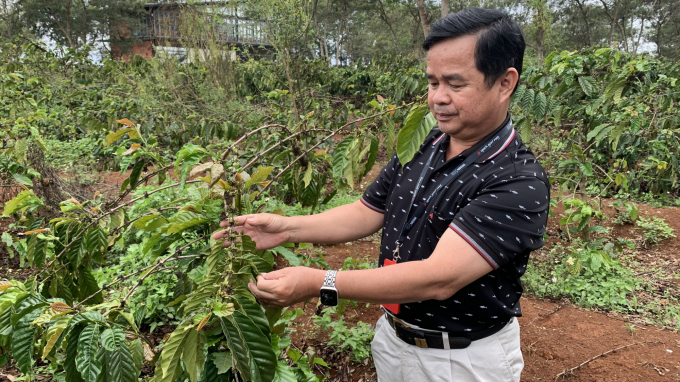
Mr. Pham Phu Ngoc, Nescafe Plan Program Director in the Central Highlands. Photo: Hoang Anh.
"Farmers' profit" is a close guiding principle and essential value of the Nescafe Plan. Nestle Vietnam and WASI collaborated on research to develop the finest coffee types that fulfill productivity and quality criteria for growers. To far, the initiative has delivered 10 million seedlings each year with the goal of assisting individuals in restoring old coffee gardens.
The second objective is to maximize the efficiency of fertilizer and irrigation water utilization. At the start of the Nescafe Plan initiative, WASI and Nestle Vietnam conducted tests that revealed the majority of coffee producers in the Central Highlands used excessive fertilizer, lowering the quality of coffee beans. A model of fertilizer efficiency was developed to illustrate that applying excessive fertilizer is detrimental to coffee and wasteful. Since 2014, this technique has proven effective, enabling farmers to save between 20% and 30% on fertilizer in comparison to previous years. Similarly, water-saving irrigation recommendations and procedures, such as monitoring humidity and watering volume with water bottles and milk cans, enable consumers to save 40%...
To restore deteriorated soil, Nestle collaborated with WASI to establish a model of organic microbial composting using all coffee waste products and integrated crop management procedures; a regenerative agricultural process that contributes to the Central Highlands' sustainable development... Nescafe Plan will continue to work with partners to support and expand to an additional 300,000ha of coffee that meets the 4C standard in the Central Highlands.
Farmers are prone to do whatever they believe would benefit them. As a result, the plan for each coffee-growing household must be customized. Nescafe Plan has developed approximately 300 leaders of farmer groups who are trained well. Our ambition stems from those 'nuclear' in order to scale up the regeneration of coffee plants in the Central Highlands. The Central Highlands motherland, which supports thousands of coffee-producing households, will undoubtedly be resurrected. Coffee producers in the Central Highlands may make a fortune directly from their land.Director of the Central Highlands region's Nescafe Plant Program
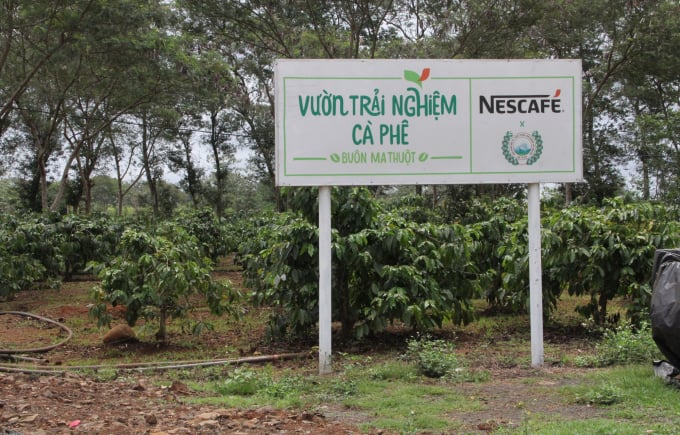
Sustainable coffee experience garden. Photo: Hoang Anh.
Additionally, Mr. Ngoc stated that the Nescafe Plan will promote the use of scientific and technical advancements in coffee production and harvesting, assisting Vietnamese coffee beans in meeting the stringent standards required by foreign markets. Whereas formerly 60% of Vietnamese coffee goods transported to other nations were returned owing to pesticide residues, this figure has dropped to less than 3%, and it is guaranteed that Vietnamese coffee will soon exceed the world's highest standards.
Translated by Linh Linh
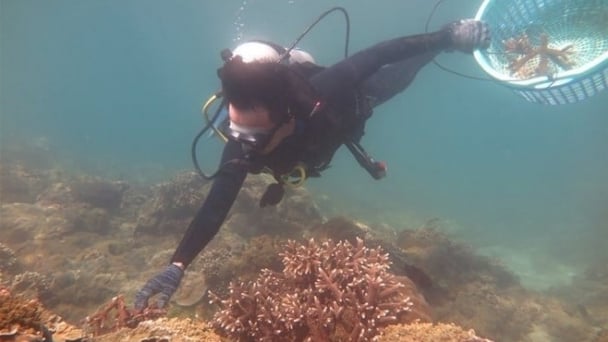
(VAN) The ocean has the capacity to absorb millions of tons of carbon, provided that mangrove forests, coral reefs, and biodiversity are protected.
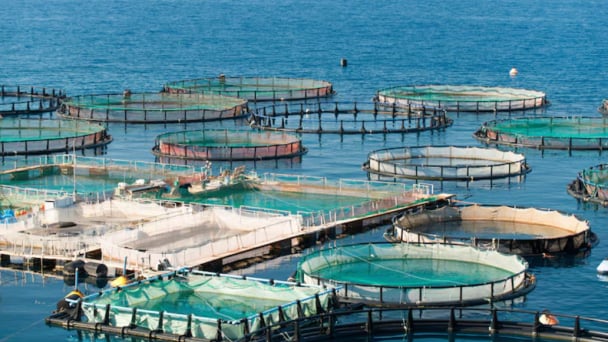
(VAN) Technology is redrawing the map of Vietnamese aquaculture: more modern, greener, and more sustainable.

(VAN) Novel process harnesses machine learning to reveal groups of genes that determine how efficiently plants use nitrogen.

(VAN) Several scientists and farmers are experimenting with soil treatment in some key durian-growing regions such as Cai Lay (Tien Giang), Dak Song, Gia Nghia, and Dak R’lap (Dak Nong).
/2025/05/25/4127-3-073637_820.jpg)
(VAN) Thanks to the promotion from an FAO-implemented project, vegetable production in greenhouses in Moc Chau has seen strong development, from 1.5 hectares in 2021 to nearly 50 hectares in 2024.

(VAN) FAO has recently supported USD 140,000 to implement the project 'Risk mitigation human-animal interface risks through disease control initiatives in pig farming.'

(VAN) The People's Committee of Tra Vinh province has approved an adjustment to the investment policy for the Green Hydrogen Plant project, increasing its area to approximately 52.76 hectares.